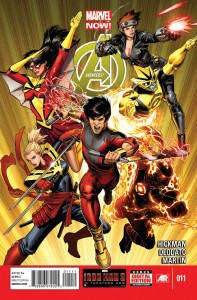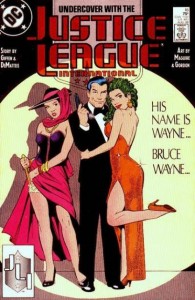 Avengers #11 has all the components of an interesting, short-term change in direction to keep the book from getting bogged down in giant international and even cosmic events. A one-and-done that still services the longer story Hickman has been spinning out, this issue has several members of the team go undercover in an overseas resort to find out what AIM is up to and discovering that they are getting ready to auction off a superpowered weapon in a particular form. It allows the characters to show some humor, demonstrate how they play off each other when they’re out of costume, and try to deal with an independent nation-state that has diplomatic immunity when the team is not in a position to just use their powers and let loose.
Avengers #11 has all the components of an interesting, short-term change in direction to keep the book from getting bogged down in giant international and even cosmic events. A one-and-done that still services the longer story Hickman has been spinning out, this issue has several members of the team go undercover in an overseas resort to find out what AIM is up to and discovering that they are getting ready to auction off a superpowered weapon in a particular form. It allows the characters to show some humor, demonstrate how they play off each other when they’re out of costume, and try to deal with an independent nation-state that has diplomatic immunity when the team is not in a position to just use their powers and let loose.
So Avengers #11 really has all the hallmarks of a cool, quirky, one-of-a-kind issue, and that is good after several issues of giant stakes and a lot of bombast. However, it is also bad, because Avengers #11 also bears the hallmarks of Justice League International #16 from August, 1988. Where members of the team go undercover in an overseas resort to find out what Bialya is up to and discovering that they are getting ready to auction off a superpowered weapon in a particular form. And they show humor while demonstrating how they play off each other out of costume. And they try to deal with an independent nation-state. That has diplomatic immunity.
Seriously: there are about a half-dozen obvious parallels between Avengers #11 and Justice League International #16 and #17. And hey: these things happen. There are no new ideas under the sun, and I take it as a given that any similarities between these two books is either a matter of parallel thinking or simple homage, because while I think Hickman’s writing is often clinical and bloodless, I have never seen it be anything but relentlessly original. And I will therefore try to review Avengers #11 on its own merits as much as I can… but that will honestly only go so far. Because the fact of the matter is that my entire experience of reading this book was colored by that feeling of familiarity, to the point where the first thing I did after finishing it was to dig out my Justice League International trades to find the issue to see if my instincts were right (if you’re curious, the issue is in JLI volume three).
So yeah: I’ll try to review Avengers #11 on its own, but it’s gonna be like reminiscing about a high school misadventure with an old buddy over beers: it’s fun to revisit, but it’s not like you can forget living it the first time, when you were young.
I’ve already recapped most of the plot that matters, but yeah: some of The Avengers go undercover at an AIM-controlled casino where they believe that some kind of super weapon is gonna be put on sale. After a planning session that runs the gamut from Captain Marvel suggesting a multi-pronged surveillance of key scientists and mid-level goons, to Black Widow’s strategy of yanking fingernails now and asking questions later, the team splits up. Sunspot and Cannonball hit the tables and try to bribe some AIM agents. Captain Marvel plays high-stakes poker with an AIM scientist for answers. Spider-Woman and Black Widow pose as bimbos to get close to some high-level personnel. And Shang-Chi uses his Stark Resilient electric nunchucks (note to self: “Electric Nunchucks” will be the name of my next ska band) to beat his way to the truth. And the truth is that there is a weapon for sale, but it’s not of a type that anyone was expecting.
As I stated before, there are a lot of Hickman books where I feel like the writing is bloodless. And by that I generally mean that he services the plot more stringently than he does the characters. We’ve seen this even in Avengers; hell, everything Ex Nihilo has ever said feels less like character dialogue and more like a Big Comics Idea dressed up in a stupid pair of horns. But that is not the case in this issue. By making the setting a plain old casino and the objective simple information gathering, it forces the focus on the characters, and the book is better because of it.
And it is better because that character focus is, in general, on these characters having fun. Without huge, Earth-shattering action demanding particular reactions, Hickman allows the characters to act normally, which give us great insight into each of them. Captain Marvel’s competitiveness at the poker table really shines, as does the interplay between Black Widow and her urge to get the job done as quickly and easily as possible, and Spider-Woman’s squeamishness at those methods – Spider-Woman’s “Unnecessary! Unnecessary!” at Widow’s level of violence, and Widow’s calm, “Well Jessica, I’m sorry… but I disagree,” is almost worth the price of admission alone. And until this issue, I always really saw Sunspot and Cannonball as not much more than a costume and a powerset a piece, but Hickman gives them a cockiness and playful nature that was simply fun. So because of the characters, this is one of the better issues Hickman’s run of Avengers.
 Which is a good thing, because those parallels with Justice League International #16 and #17 are really fucking distracting, man. Let’s just lay them out:
Which is a good thing, because those parallels with Justice League International #16 and #17 are really fucking distracting, man. Let’s just lay them out:
- The team thinks that a terrorist state is selling weapons? Check.
- Team goes undercover to a luxury resort to find out what’s going on? Yup.
- Team’s cover is blown early, leading them to improvise new plans on the fly? Uh-huh.
- Team discovers that the “weapon” is actually a superhuman threat? Oh, yeah.
- Team can’t act directly because the resort is on sovereign territory? Sure!
- A bunch of humor when the team is together trying to plan strategy? Bingo!
I will admit that my memory played tricks on me, in that I could have sworn that Batman and Fire played some table games in the old issue (they did not; there’s actually no casino in sight in JLI), but there were enough points of obvious comparison that I felt less delight over getting to know some of these characters better than I did than I felt a distracting sense of deja vu. And while I think this is probably more a case of parallel thinking than any kind of direct influence – hell, with Skyfall being such a big hit just a few months ago, it was only a matter of time before someone put superheroes into a James Bond-style undercover mission – the similarities are distracting, and for me, disappointing. It cast a shadow over what was otherwise a solid character story, and while not everybody will be familiar with a quarter-century old, barely-reprinted catalog story, I was. As will anyone else who knows the JLI issue. And the book suffers because of it.
Mike Deodato’s art continues to be spectacular. This is not the normal kind of issue for him – he does killer action sequences, and this book is mostly people sitting around talking – but his stuff continues to be extremely detailed and almost photorealistic. His figures are on the idealized side of realistic (hidden a bit by everyone wearing actual, non-superhero clothes), and his facial expressions are excellent. With that said, there were some things here that didn’t agree with me, and those things were Photoshop: some backgrounds are clearly actual photographs, and all the card faces at the poker table are photos matted into the art. And this is a matter of personal taste, but I don’t like that kind of stuff; it’s distracting. Photoshopped elements in comic art, no matter how realistic that comic art is, always looks like bad CGI in a mid-90s action flick; it stands out, and prevents me from sinking into the other visuals. But putting those elements aside, this is damn pretty art, with good work by colorist Frank Martin, who takes Deodato’s usual bright, clean superhero visuals and darkens them, making things look more noir than summer blockbuster. If you can get past the ‘Shopping, there is a lot to like in the art here.
Taken on its own, Avengers #11 is a solid, character-based work with good art, and well worth reading. But if you, like me, are an old fart who was into Justice League International when you were in high school, you’re gonna see that old issue in this new comic book. If you can put that aside, this is a good comic book… but again: if you’re like me, you’re gonna have a hard time putting that aside.
 Podcast RSS Feed
Podcast RSS Feed iTunes
iTunes Google Play
Google Play Stitcher
Stitcher TuneIn Radio
TuneIn Radio Android
Android Miro Media Player
Miro Media Player Comics Podcast Network
Comics Podcast Network